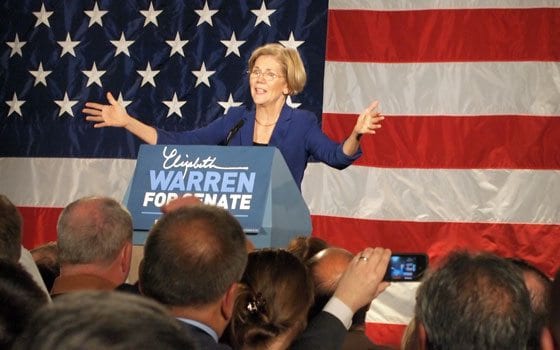Harvard Professor Elizabeth Warren scores a stunning upset over U.S. Senator Scott Brown


Author: Don WestUS Senator-elect Elizabeth Warren delivers her victory speech at the Fairmount Copley Hotel after beating incumbent Scott Brown 53 percent to 47 percent.
In a race that pitted a democratic newcomer against a GOP rock star, Elizabeth Warren, the Harvard Law School professor that was roundly attacked for her claims of Indian ancestry, earned a solid victory against incumbent U.S. Senator Scott Brown.
With about 70 percent of the precincts counted, Warren, the mastermind of the federal Consumer Financial Protection Bureau, held a 53 to 47 lead over her GOP rival and reclaimed the seat once held by the late U.S. Senator Ted Kennedy.
Gov. Deval L. Patrick, speaking in the ballroom of The Fairmont Copley Plaza hotel where Warren’s election night party was being held, said he was in awe of the record $65 million raised in the Senate contest, and offered his prediction for the night. “I don’t think it’s going to be a late night,” Patrick told reporters.
The race between Warren and Brown was tight going into Election Day with neither candidate able to create much separation from the other. The difference, political experts explained, was Warren’s superior ground game.
Warren’s campaign officials said they had 48 field offices, 74 paid field organizers and about 24,000 volunteers working for them on Tuesday. That amounted to an average of about 10 in each of the state’s 2,174 precincts to get her supporters to the polls. In the days before the election, those campaign workers knocked on an estimated one million doors and made two million phone calls.
On Saturday alone, according to published reports, they made more than 370,000 phone calls and knocked on more than 123,000 doors.
“The ground game is the only thing that matters in the end,” John Walsh, chairman of the state Democratic Party, told the New York Times.
Warren’s election gives the Democratic Party a solid win in their bid to control the U.S. Senate. Brown had caste himself as a so-called moderate swing vote, but on issues such as abortion rights, women’s equal pay and the appointment of U.S. Supreme Court Justice Sonia Sotomoyer, Brown went with the GOP Party and opposed President Barack Obama.
Before the election, the Democrats controlled the Senate by a narrow 53-47 margin.
Warren left little to chance. Unlike Brown’s first challenger, Massachusetts Attorney General Martha Coakley, Warren appeared to enjoy the retail side of political campaigning, appearing in Roxbury on several occasions and spreading her message of protecting the middle class to all who would listen.
That strategy paid off as a record number of black and Latino voters turned out at polling places across the state. When Brown ran to fill the seat left vacant by the death of Ted Kennedy, black and Latino voters had a turnout of about 30 percent. That number was expected to at least double in this campaign.
The phenomenal ground game was coupled with an impressive ad campaign. In her closing television ads, Warren touted her claim as a fighter for the middle class. “Know this,” she said. “My fight is for you. Always has been. And I won’t back down, no matter how long the odds or how powerful the opposition.”
That opposition was powerful. Scott Brown, a then little know state senator from Wrentham, was catapulted into the national spotlight after his surprising win over Coakley in 2010. He did so on the strength of his everyman campaign where he drove in a pickup truck across the state and attracted mostly white, independent and conservative suburbanites.
But in the last days of the campaign, Brown tried to convey a message of bipartisanship, stressing his ability to work with democrats and even using a photograph of himself with President Obama.
He was deemed the second-most bipartisan member of the Senate by Congressional Quarterly, a fact Brown never hesitated to tout on the campaign trail.
That strategy didn’t work. In black and Latino neighborhoods, Brown’s message was too little and too late. The electoral math was just too daunting. In this overwhelmingly blue state, Brown would have needed about 60 percent of independent voters and 20 percent of registered Democrats to win.
Doug Rubin, senior political strategist for the Warren campaign, said that Democrats should be proud of Warren’s campaign.
Rubin served in the same capacity for both of Patrick’s successful gubernatorial campaigns and told reporters gathered at the Fairmont-Copley Hotel that that Warren succeeded in building enough excitement around her campaign to turn out huge numbers of volunteers and voters for today’s election.
“To have 20,000 people volunteering for the campaign on election day is phenomenal,” Rubin told reporters. “Elizabeth engaged the grassroots aspect of this from the beginning and focused on the issues important to the people of Massachusetts. We’ve built a grassroots campaign larger than we did for Gov. Patrick, which we thought wasn’t possible. It’s the person-to-person campaigning that really excited me. In the age of Super PACs, being able to engage so many people at the ground level says a lot about her. No matter what happens tonight, she has already succeeded in so many ways.”
Material from published reports contributed to this story.






